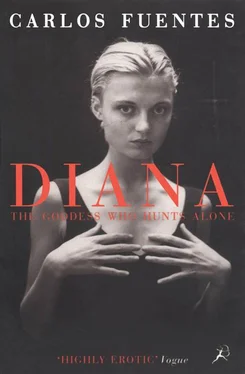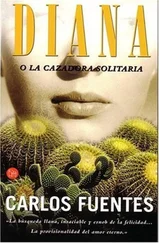Carlos Fuentes - Diana the Goddess Who Hunts Alone
Здесь есть возможность читать онлайн «Carlos Fuentes - Diana the Goddess Who Hunts Alone» весь текст электронной книги совершенно бесплатно (целиком полную версию без сокращений). В некоторых случаях можно слушать аудио, скачать через торрент в формате fb2 и присутствует краткое содержание. Год выпуска: 2012, Издательство: Bloomsbury UK, Жанр: Современная проза, на английском языке. Описание произведения, (предисловие) а так же отзывы посетителей доступны на портале библиотеки ЛибКат.
- Название:Diana the Goddess Who Hunts Alone
- Автор:
- Издательство:Bloomsbury UK
- Жанр:
- Год:2012
- ISBN:нет данных
- Рейтинг книги:3 / 5. Голосов: 1
-
Избранное:Добавить в избранное
- Отзывы:
-
Ваша оценка:
- 60
- 1
- 2
- 3
- 4
- 5
Diana the Goddess Who Hunts Alone: краткое содержание, описание и аннотация
Предлагаем к чтению аннотацию, описание, краткое содержание или предисловие (зависит от того, что написал сам автор книги «Diana the Goddess Who Hunts Alone»). Если вы не нашли необходимую информацию о книге — напишите в комментариях, мы постараемся отыскать её.
Diana the Goddess Who Hunts Alone — читать онлайн бесплатно полную книгу (весь текст) целиком
Ниже представлен текст книги, разбитый по страницам. Система сохранения места последней прочитанной страницы, позволяет с удобством читать онлайн бесплатно книгу «Diana the Goddess Who Hunts Alone», без необходимости каждый раз заново искать на чём Вы остановились. Поставьте закладку, и сможете в любой момент перейти на страницу, на которой закончили чтение.
Интервал:
Закладка:
Azucena didn’t talk about it, but there could be no doubt she’d passed through war and dictatorship, she’d seen prison and death, she knew about the hangman’s knot, and the Guardia Civil filled her with dread. But her work went on: sow, plow, sell lettuce, or wait tables. If she didn’t confer dignity on her work, no one else would. The perspective of that work was continuity, permanence. She was where she was to suit herself and no one else, and that’s where I saw the contrast, when I visited the set from time to time in the afternoon to meet with Diana, the hairdresser, and the stunt-man. They and the other actors, the technicians, the producers, the director were all immensely anguished, hiding their anguish behind a jolly mask.
The joke, perpetual joking, is another atrocious trait of North Americans. The wisecrack, the snappy retort, the ironic or witty answer — they’re all an extensive but thin mask covering the vast territory of the United States and disguising the anguish of its inhabitants, the anguish of moving around, of not being still in a single place, of arriving at another place, doing, getting things done, making it. North Americans detest what they’re doing because all of them, without exception, would like to do something else so as to be something more. The United States had no Middle Ages. That’s the big difference between it and Europe, of course, but it’s also the biggest difference between them and us. We Mexicans descend from the Aztecs but also from the Mediterranean — the Phoenicians, the Greeks and Romans, from the Jews and Arabs, and along with all of them, medieval Spain. To get to Mexico you must travel the route to Santiago — not the movie set in Mexico but Santiago de Compostela in Spain — as did pilgrims. Later, when my Harvard students would complain about the remote traditions I dragged out to explain contemporary Latin America, I ask them: “And for you, when does history begin?”
They always answered: “In 1776, when our nation was born.”
The U.S.A., sprung like Minerva from the brow of Jupiter, armed, whole, enlightened, free, envied … and blessed with social mobility, always higher, to be always something more, someone more, more than the person next door. The country without limits. That was its grandeur. Also its servitude.
Azucena was the lady’s maid, the invisible, worthy, serenely satisfied servant. At times it was impossible to know if she was there or not. She walked through the Santiago house like a cat. One morning, she came in with the breakfast tray to wake Diana and found us screwing — well, ostensibly we were screwing: a sumptuous sixty-nine that we could not disguise. She dropped the tray. In the huge clatter, Diana and I awkwardly disconnected ourselves. By chance, because of my position or the light, my eyes caught Azucena’s. In her eyes, I saw the vertigo of her imagining herself loved.
XIII
In very tender, very vulnerable moments that I thought I was sharing with Diana, investing her with qualities, if that’s what they were, or lacks of defense, which is what they turned out to be, I invited her to give it all up, to come with me to one of those North American university positions I was offered from time to time. I’d never taught in a gringo university. What I imagined was a bucolic haven surrounded by lakes, with ivy-covered libraries — and good stationers, the supreme attraction the Anglo-Saxon world holds for me.
I feel a professional distress in Latin countries: the low quality of the paper, my work material, is a negative comparable to a painter’s being deprived of paint or given brushes but no canvases. The ink bleeds through notebooks made in Mexico; Spanish paper comes right out of the ancient mercantile or accounting world Pérez Galdós describes in his novels — it’s first cousin to the abacus and brother to parchment — and in France a sourpuss salesgirl blocks the way to any writer curious to smell, touch, or feel the nearness of paper.
In the Anglo-Saxon world, by contrast, the paper is as smooth as silk, the selection brilliant, extensive, well-ordered. To enter a stationery store in London or New York is to penetrate a paradise of writerly fruits, pens that fly like hawks, pads that are as pliant and responsive as a loving hand, paper clips that are silver brooches, portfolios as grand as protocols, labels that are credentials, notebooks that are deuteronomies… For years, I would go back to Mexico loaded with satin-paper notebooks for my friend Fernando Benítez so that he could write his great books about the survival of indigenous cultures in Mexico comfortably and sensually. The ideological exclusion laws of McCarthyism kept him from entering the States — he couldn’t even buy good workbooks. But that’s another story. The Mexican poet José Emilio Pacheco says that the first thing he does before buying a book is to open it at random and stick his nose between its pages. That magnificent scent, comparable to aromas that might be found between a woman’s breasts or legs, is multiplied a thousandfold in the stacks of the great university libraries in the United States. Now I was inviting Diana, not too seriously, I admit, and with a kind of defenseless enthusiasm, I repeat. If you want, I said, we can live together in a university, you could go out and make your films …
She interrupted me. “It would be better than Santiago.”
I was thankful for the little notes she sent me every day from location up in the mountains while I went on writing my oratorio. The best one (which I’ll keep forever): “My love — If we manage somehow to survive this place, we will be invincible. What can separate us? I love you.” But now she said that yes, living on an American university campus would be nice. Every year, she would go back to her hometown in Iowa to celebrate the Thanksgiving that only gringos celebrate. It reminds them of their innocence, which is what they’re really celebrating. They evoke the completion of the first year spent in New England by the Puritans who founded the Massachusetts Bay Colony when they reached Plymouth Rock in 1620, fleeing from religious intolerance in England.
To amuse my friends, I refer to the Puritans as the first wetbacks in the United States. Where were their visas, their green cards? The Puritans were immigrant laborers, just like the Mexicans who cross the southern frontier of the U.S. today looking for work, finding instead, sometimes, billy clubs and bullets. Why? Because they’re invading — with their language, their food, their religion, their hands, and their sex — a space reserved for white civilization. They’re the savages returning. The Puritans, on the other hand, enjoy the easy conscience of the civilizer. They steal land, murder Indians, decree the separation of the sexes, impede the mixing of the races, impose an intolerance worse than what they left behind, hunt down imaginary witches, and yet are the symbols of innocence and abundance. Each November, a huge turkey stuffed with apples, nuts, and spices and dripping with rich gravy confirms the United States in the certitude of its double destiny: Innocence and Abundance.
“You go back to that every year?”
She said that was actually her best role. To pretend that she was still a simple country girl. It wasn’t hard for her to act out middle-class values. They were mother’s milk to her; she grew up with them. “It’s the role my parents expect of me. It’s not hard. I tell you, it’s my best part. I should get an Oscar for how well I carry it off. I become the girl next door again. The neighbor. You’re right.”
Her eyes veiled over with nostalgia. “Wherever I am, the last week in November I go back home and celebrate Thanksgiving.”
“How do they react? Your parents, I mean.”
“They serve wine. It’s the only time they do. They think that if they serve wine I’ll be happy, that I won’t miss Paris. They see me as a strange, sophisticated girl. I make them think I’m still the same small-town girl I always was. They serve French wines. It’s their way of telling me they know I’m different and they are always the same.”
Читать дальшеИнтервал:
Закладка:
Похожие книги на «Diana the Goddess Who Hunts Alone»
Представляем Вашему вниманию похожие книги на «Diana the Goddess Who Hunts Alone» списком для выбора. Мы отобрали схожую по названию и смыслу литературу в надежде предоставить читателям больше вариантов отыскать новые, интересные, ещё непрочитанные произведения.
Обсуждение, отзывы о книге «Diana the Goddess Who Hunts Alone» и просто собственные мнения читателей. Оставьте ваши комментарии, напишите, что Вы думаете о произведении, его смысле или главных героях. Укажите что конкретно понравилось, а что нет, и почему Вы так считаете.












